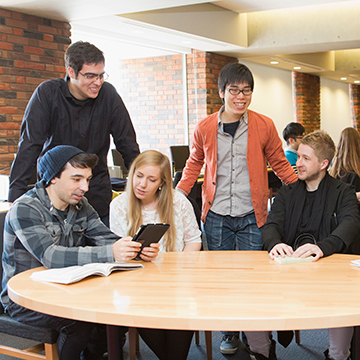College of Intercultural Communication
Ikebukuro Campus
OBJECTIVE.
The force of globalization moves the world and its peoples, every community and every citizen. CIC approaches this dynamism by turning knowledge into practice to solve complex problems.
About
College of Intercultural Communication
CIC provides students opportunities to put these learned intercultural communication skills into practice. Students utilize these skills when studying abroad. And this link between theory and experience can also happen at Rikkyo, such as, through the teaching of Japanese to local community members, helping immigrant students, interacting with students in English, doing translation/interpreting work, or working with international students visiting CIC.
Department
-
Department of Intercultural Communication
Studies at CIC aim to instill confidence —confidence that is connected to: logical thinking, the spirit to challenge, and language ability.
Logical and critical thinking are key to understand others and to express your ideas. It is through understanding others and expressing oneself that solutions can be found and enacted. In order to achieve this ability and gain confidence in it, students are taught to view issues from multiple perspectives.
The spirit to challenge a problem, a different culture, or a different point of view is necessary in order to be an active participant in the world. Real-world problems need real-world solutions and these can only come when people seek them out. Confidence comes from the practice of overcoming the unknown, from facing friction without fear.
Confidence in using another language can be elusive if students only focus on language perfection. At CIC, language ability is viewed as a lifelong pursuit and communicating for understanding is the first step. Rikkyo and CIC provide ample opportunities for you to improve your language abilities; it is up to you to do so.
The Dual Language Pathway (DLP), a course for selected students, in which they can take classes and write their graduation research project (graduation paper) in English
Students gain the skills to use rich, correct Japanese in order to improve their ability to think logically and communicate in a variety of contexts while also acquiring a high level of English proficiency. In addition to studying all specialized subjects required for graduation in English, as a general rule, students are expected to study abroad from the second semester in their second year for one year at the academic level in English and write a graduation thesis in English.
The DLP accommodates up to 15 students through the Entrance Exam for International Courses. The DLP is a study environment for a select few that develops individuals who will contribute to the global society of our paralinguistic world.
Intended learning outcomes
-

Students will understand the differences between themselves and others objectively and learn to communicate with others logically and clearly.
-

Students will learn English and another language, forming multilingual and multicultural skills necessary to interact with others in the world.
-

Students will gain language and communication skills and put them into practice when cooperating with others on real-life issues.
-

Students will build positive relationships, regardless of differences in thought or background, and pursue solutions for a sustainable future.
Learn more
For more information, please visit the links below.

